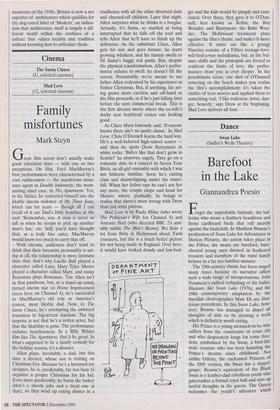Cinema
The Santa Clause (U, selected cinemas) Mad Love (12, selected cinemas)
Family misfortunes
Mark Steyn
Great film actors don't usually make good television stars — with one or two exceptions. On film, Fred MacMurray's best performances were characterised by a cool ruthlessness — the murderous insur- ance agent in Double Indemnity, the wom- anising chief exec. in The Apartment. Yet, in the Sixties, he converted himself into the likable sitcom widower of My Three Sons, which ran for years — though all I can recall of it are Dad's little homilies at the end: 'Remember, son. A man is never so tall as when he stoops to pick up another man's hat,' etc. Still, you'd have thought that, as a truly fine actor, MacMurray would know too much to carry that off.
With sitcoms, audiences don't want to think that their favourite personality is act- ing at all; the relationship is more intimate than that: that's why Lucille Ball played a character called Lucy, Mary Tyler Moore played a character called Mary, and today Roseanne plays Roseanne. Tim Allen isn't in that pantheon, but, as a stand-up comic turned sitcom star on Home Improvement (seen here on Channel 4), he's succeeded to MacMurray's old role as America's cosiest, most likable dad. Now, in The Santa Clause, he's attempting the awkward transition to big-screen stardom. The big surprise is not that he's a rotten actor, but that the likability is gone. The performance radiates heartlessness. In a Billy Wilder film like The Apartment, that'd be great. In what's supposed to be a family comedy for the holiday season, it's a disaster.
Allen plays, inevitably, a dad, but this time a divorce, whose son is visiting on Christmas Eve. Because he's a harassed toy designer, he is, predictably, far too busy to organise a proper Christmas for his kid. Even more predictably, he burns the turkey (that's a sitcom joke and a tired one at that), so they wind up eating dinner in a roadhouse with all the other divorced dads and cheesed-off children. Later that night, Allen surprises what he thinks is a burglar. Actually, it's Santa, so startled at being interrupted that he falls off the roof and tells Allen that he'll have to finish up the deliveries. As the substitute Claus, Allen gets his suit and goes hirsute: he starts growing whiskers, and his tummy swells to fill Santa's baggy red pants. But, despite the physical transformation, Allen's perfor- mance refuses to swell: he doesn't fill the screen. Presumably, we're meant to see father Allen redeemed by his experience as Father Christmas. But, if anything, his act- ing grows more careless and off-hand as the film proceeds, as if he's just killing time before the next commercial break. This is the first divorce movie where the ex-wife's dorky new boyfriend comes out looking good.
As Chico Marx famously said, 'Everyone knows there ain't no sanity clause.' In Mad Love, Chris O'Donnell learns the hard way. He's a well-behaved high-school senior and then he spots Drew Barrymore in white socks: 'Babes like that don't grow in Seattle!' he observes, sagely. They go on a romantic date to a concert by Seven Year Bitch, an all-girl ensemble with which I was not hitherto familiar. Soon he's cutting class and skinnydipping under the water- fall. When her father says he can't see her any more, the couple elope and head for Mexico, where, gradually, he beings to realise that there's more wrong with Drew than just strict parents.
Mad Love is by Paula Milne (who wrote The Politician's Wife for Channel 4) and Antonia Bird (who directed BBC 2's ami- ably risible The Men's Room). We hear a lot from Brits in Hollywood about Yank crassness, but this is a much better picture for not being made in England. Over here, it would have looked dowdy and low-bud- get and the kids would be pimply and ema- ciated. Over there, they gave it to O'Don- nell, best known as Robin, the Boy Wonder, and Barrymore, the Babe Won- der. The Hollywood treatment plays against the film's theme, and makes it more effective. It starts out like a grungy Nineties remake of a Fifties teenage-love- will-find-a-way melodrama, but, as the bal- ance shifts and the principals are forced to confront the limits of love, the perfor- mances draw you in ever deeper. In the penultimate scene, one shot of O'Donnell cowering on the beach makes you realise the film's accomplishment: it's taken the clichés of teen movies and applied them to something real. like rudeness, noise, dan- ger, honesty,' says Drew at the beginning. Mad Love delivers all four.










































































 Previous page
Previous page